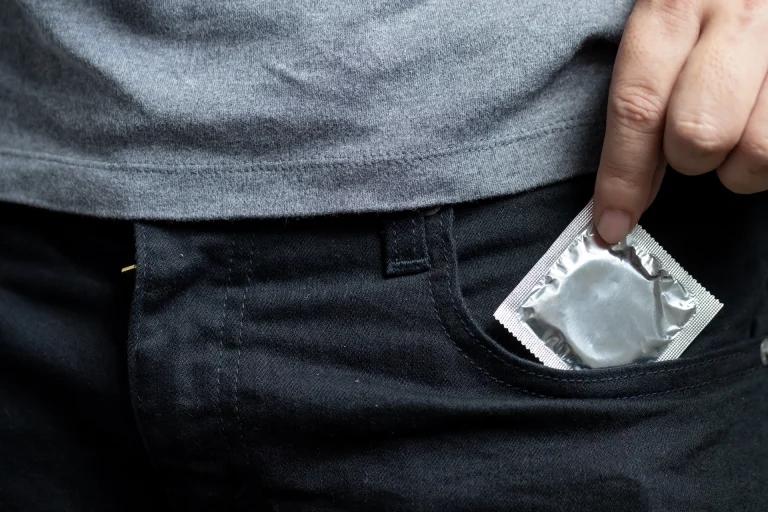To say losing an erection during sex can be stressful or upsetting is putting it mildly. It can feel devastating for both you and your partner. And if you say: “this has never happened to me before”, it just makes things worse. So, rather than having to say those words, it’s time to do something about it.

Let’s start now. To help you out we’ll explain why you might have lost an erection and what you can do to stop it from happening again.
Why might I lose an erection during intercourse?
Guys are complicated. Male sexuality is complex and erections aren’t straightforward. To get and maintain an erection you need a circulatory system that can deliver enough blood to your penis to get and keep it hard. You also need nerves that can carry the right signals and the right amounts of certain hormones like testosterone. Being in the right frame of mind helps too, as your psychology is just as important as your physiology. So, what can cause you to lose an erection during sex?
Anything that affects the above can make you lose an erection. Conditions that restrict your blood flow, like having high blood pressure, high cholesterol, heart disease or artery disease can make it tougher to sustain an erection. Other conditions that alter your hormone levels, like obesity and thyroid issues, or cause damage to your nerves like diabetes or multiple sclerosis can also interfere. You might also find that various prescription medicines including antidepressants as well as alcohol and recreational drugs can also make it more difficult to get and keep an erection. Honestly, it’s a minefield.
That’s before you get onto the range of psychological issues that can also wreak havoc with your ability to stay hard. We’re talking stress and anxiety, which can constrict your blood flow and alter your hormone levels. Mood disorders like depression can also reduce your desire for sex. You may find it more difficult to keep an erection if you suffer from performance anxiety or if you watch a lot of pornography.
Does losing an erection during sex mean I’m not aroused?
Losing an erection during sex can mean you’re not aroused. But as we’ve already said there are so many reasons you can lose an erection. This means that your level of arousal or your desire for your partner can sometimes have nothing to do with it.
Does losing an erection mean I have erectile dysfunction?
Erectile dysfunction (ED), is when a man can’t get or keep an erection that’s hard enough for sex. You don’t necessarily have ED if you lose an erection during sex. Every man loses an erection now and again and if it only happens once or rarely, you might just be having an off day.
If you lose your erection more often however you may well have ED. If this is the case you should talk to a doctor about it. A doctor can give you an official diagnosis and start the process of assessing your health and mental health to find out what’s causing your ED.
Talking to your partner about losing an erection
Some conversations are more fun than others and chances are this is not going to be one of the easy ones. This is an important conversation though. It’s one you need to have.
Your natural reaction to losing an erection during sex may be to go quiet, try and deal with it yourself or avoid the issue and pretend it never happened. None of this will help your relationship in the long run. Your partner may blame themselves. They might think they’re not attractive enough, they don’t excite you or they aren’t pleasing you in bed. If you don’t address these worries they can fester, grow and eat at your relationship.
Tell your partner that you want to talk about the issue. Choose a time when you’re both free from other commitments and distractions and can focus on each other. Explain that almost all men lose erections at some point and that there is a range of possible causes. Plan to reassure and explain that it’s not their fault. Plan to listen too.
It may help if you can bring the conversation to a close on a positive and proactive note by telling your partner what you have done or plan to do next, such as seeing your doctor.
How do i avoid losing an erection in the future?
So, what can you do to help yourself get and keep an erection? There are a range of treatments and steps you can take to tackle erection problems. Which ones are right for you will largely depend on what’s causing your issue, but they can include:
Psychotherapy for erectile dysfunction
If you have ED caused by psychological problems – this could include depression, performance anxiety, relationship issues or pornography addiction – psychotherapy may be the most beneficial treatment. There are loads of different approaches to choose from. These include cognitive behavioral therapy, psychodynamics and couples’ therapy – you may have to spend some time experimenting to see which approach works best for you.
Erectile dysfunction medications
Can Viagra help with erectile dysfunction? Yes, there are a range of effective ED medications available, like Viagra, that can help to banish ED. The most popular choices include:
- Sildenafil (Viagra)
- Tadalafil (Cialis)
- Vardenafil (Levitra)
Try other ED aids
Penis pumps can help you get and keep an erection and cock rings can also help. They even have some other benefits too. Read more about how cock rings can help with erections.
Lifestyle changes for erectile dysfunction
Your erections are also an indication of your overall level of fitness and health. The better your body is working the better your erections will be. You can improve your chances of getting and staying erect by:
- Losing excess weight and maintaining a healthy body mass index (BMI)
- Getting regular exercise
- Eating a healthy diet full of food that can help your erections
- Managing your blood pressure and cholesterol levels
- Getting enough sleep each night
- Limiting how much alcohol you drink
- Not smoking or taking recreational drugs
Sources
NowPatient has taken all reasonable steps to ensure that all material is factually accurate, complete, and current. However, the knowledge and experience of a qualified healthcare professional should always be sought after instead of using the information on this page. Before taking any drug, you should always speak to your doctor or another qualified healthcare provider.
The information provided here about medications is subject to change and is not meant to include all uses, precautions, warnings, directions, drug interactions, allergic reactions, or negative effects. The absence of warnings or other information for a particular medication does not imply that the medication or medication combination is appropriate for all patients or for all possible purposes.









